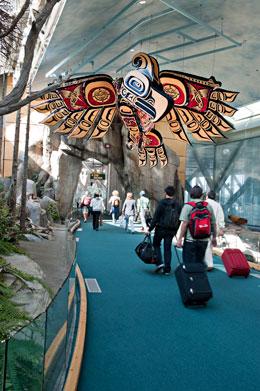New travel scheme will impact many Asian visitors

Hongkongers holding SAR or British National (Overseas) passports and travellers from many Asian countries will need to obtain extra documentation before flying to Canada, as Ottawa tightens its visa-free arrangements worldwide.
The new policy will require passengers to apply online for an “electronic travel authorisation”. It will take effect from March 15, according to the Canadian government.
Prospective travellers have until March 15 to submit passport and other personal information through Citizenship and Immigration Canada’s website for pre-screening. Without the documentation, travellers face being denied entry when the border enforcement kicks in.
The authorisation covers all foreign nationals except US citizens. Hong Kong – though branded as a partner of “productive cooperation” on the country’s consulate website and home to one of the largest Canadian communities abroad – is not exempted from the scheme.
Half a million people of Hong Kong descent live in Canada, according to the consulate here.
Canadians do not require a visa to travel to Hong Kong.
The new scheme, which applies to those who fly to or through Canada but not those reaching Canada by land or sea, is likely to add logistical headaches for those with families and friends living or studying there.
“It’s of course better without, but since it’s not expensive and it’s not the first country imposing such measures, it’s OK for me,” said Louisa Wong, who holds a Hong Kong passport and whose family lives in Toronto, according to the Standard.
Canadian officials said an application asks for the applicant’s name, date and place of birth, gender, address, nationality and passport information.
They advise travellers to register at least three days in advance of their departure. The authorisation will cost C$7 (HK$39) and will be valid for up to five years.
It is part of a beefed-up border policy that pre-screens travellers for security threats.
The federal government has called it a “strengthened methodology in order to better identify high-risk travellers”.
“Providing the information required by these amendments will allow Canada to determine the admissibility of foreign nationals before they arrive at the border and whether their travel poses migration or security risks,” the immigration department was quoted by Canadian newspaper The Star as saying.
The number of visa-exempt foreign nationals travelling to Canada on a temporary basis per year is significantly larger than the number of visa-required travellers. For example, visa-exempt foreign nationals, excluding U.S. citizens, represent approximately 74 per cent of foreign nationals who arrive by air in Canada.
In 2012–2013, the total number of visa-exempt foreign nationals who arrived in Canada and were deemed inadmissible for entry at air ports of entry was 7,055. This resulted in significant expense, delay and inconvenience for these foreign nationals, other travellers, the airlines and the Canadian government. Reasons for refusal can include membership in terrorist organizations, espionage, participation in war crimes or crimes against humanity, international human rights violations, membership in organized crime groups, criminality, or issues endangering public health, such as tuberculosis.
What is the eTA?
The eTA is an online registration system that travellers access online. eTAs are valid for five years, or until the expiration date of a passport, whichever comes first.
Who Needs an eTA?
The eTA requirement applies to travelers who do not need a visa to enter Canada and who are planning to arrive by air. Visa exempt countries include the UK, Japan, Australia, Korea, countries in the European Union and more. The eTA requirement does not apply to citizens of the US and it is not required if a person is entering at a land or sea port of entry. Nationals of certain visa-required countries (Brazil, Bulgaria, Mexico or Romania) who hold a current US non-immigrant visa, or who have held a Canadian visa in the past ten years, will be allowed to enter Canada with an eTA instead of a visa. This special visa exemption may not, however, be in place by 15 March 2016.
What is the eTA Application Process?
The eTA process involves entering a traveler's personal details and passport information into an online portal and paying a fee of $7CAD. Every traveler must obtain an eTA – including children. In most cases, CIC will approve the eTA within minutes of applying. In situations where an immediate decision is not given, Citizenship and Immigration Canada (CIC) will follow up with applicants with requests to obtain more information.









